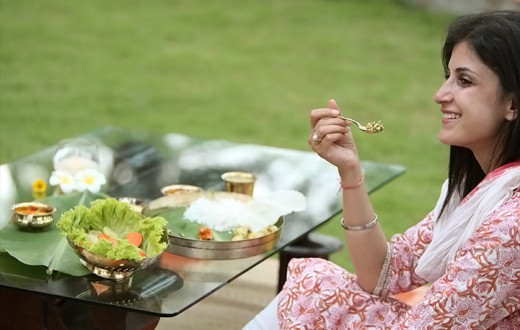Consider this: “I am miserable because of so and so situation/person.”
A much too familiar statement? But is it a statement of truth or of myth?
If Rishi Vasistha, one of the seven great Rishis (Saptarishis) of ancient India, is to be believed, it is a myth! He explains how and some other astonishing truths in his dialogue with Lord Rama in the grand scripture, the Yoga Vasistha. In the process, he breaks some long-held myths, fills you with awe and finally, shows the possibility of a life less ordinary. Here is a glimpse of the truths from the scripture.
1. With no evil, the universe will cease to exist
We all believe the world is running because of the good in the world. But, would the goodness and the world exist if there was no evil?
The scripture suggests that creation could cease if demons fail to live according to their natural demonic natures.
As Lord Vishnu in the text explains, “With no threat from the demons, the gods in heaven will have nothing to fear and hate. With that, they will soon attain liberation and the universe will abruptly cease to be. If the demons function as the enemies of the gods, righteous actions shall prevail in this creation: and thus will this creation continue to exist and flourish, not otherwise.”
So, while we may reel in anger or fear because of the conflicts we witness in the world, there is a higher purpose to all of these. The tussle between the good and bad is what keeps this creation going. Every person - the hero and the villian - counts in turning the wheels of the world. With this acceptance of truth, be at peace within and fight the other side like a true warrior.
2. We weep, we fear not because of the other, but because of our own mind
Imagine you are meditating on a boat floating in the sea and another boat strikes your boat and stirs you from your meditation. You are angry and you open your eyes only to see the other boat is empty. There was no one who brought you anger. The empty boat just acted as a trigger.
We often attribute situations and people for our miseries. The Yoga Vasistha, however, declares our minds to be the ultimate cause of our miseries.
The scripture illustrates this through the following story.
Once, a person with thousand arms and limbs while roaming a deep forest, beat himself with a mace. Afraid of the beating, he ran in panic. Wandering restlessly, he fell into a blind well, then entered the forest and then entered a banana grove. All this while he continued to beat himself and run in frenzy. Though there was no other being to fear, he wept and cried aloud in fear. He kept running as before, beating himself as before.
The person with thousands of arms signifies the mind with countless distortions and latent tendencies. The blind well and banana grove denote hell and heaven respectively. The dense forest denotes the world. The mind wanders into hell, heaven and the world of human beings, punishing itself all the while with its own distortions and latent tendencies. It is these tendencies that bind us to the world through delusion, hatred, fear, envy and anger.
3. Self-inquiry dissolves all latent tendencies and is a pathway to liberation
If latent tendencies chain our minds with sorrow, then probing into questions such as ‘Who am I?’ can release you from them.
The magic of an age-old question
Since time immemorial, the question ‘Who am I?’ has puzzled humanity. Many drop it in the pursuit of attaining worldly gains. Only a handful care to stay with it.
Gurudev Sri Sri Ravi Shankar assures that the question can bring all things wonderful: happiness, confidence, and intuition. “The very spirit of inquiry will lift you to another dimension which is free from worry and depression.
Forget about all the books and philosophies and just ask yourself this question, 'What is my origin, where have I come from? I have been here for so many years, but where was I before that? Did I exist at all before my current age?'
You just have to ask this question, nothing else! It should be a genuine question that should come from inside and not because I am telling you. The answer you get could be stimulating, stunning or confusing. I say, all three are good!”
We learn about the power of self-inquiry as the story above proceeds.
Lord Brahma seeing the struggle of the thousand-armed person restrained him for a moment with the power of his will. He, thus, asked him, “Who are you?” At this, the person accused Lord Brahma as his enemy and wept aloud. As the tears dried, his lips gave way to a raucous laughter. Then he began to abandon his body—limb by limb.
Lord Brahma came across several like him - beating themselves, wailing and wandering. He restrained each of them with the power of his will. Some ignored him. Some detested him. Some listened to his words. The ones who cared to listen, stopped the beating and the wailing. It was almost like they had been given a fresh lease of life.
To a seeker, the three-word question, ‘Who am I?’ is capable of dissolving all your latent tendencies and fear if asked with sincerity.
4. Wise words are mere words not wisdom
Thinning your desires and anger is a stronger mark of wisdom than speaking wise words!
As Rishi Vasistha says, “A painted pot of nectar is not nectar, nor a painted flame fire, and a painting of a woman is not a woman: wise words are mere words not wisdom, unless they are substantiated by the absence of desire and anger.”
5. Enlightenment is not an outcome of penance, charity, and observances of religious vows
Many believe that performing penance, charity, observing religious vows and going to pilgrims brings one onto the path of enlightenment or self- realization. But, the Yoga Vasistha refutes, saying these only give temporary relief from the world’s sufferings and points out the futility of each.
Rishi Vasistha comments, “Austerity or penance is self-inflicted pain. Of what value is charity performed with wealth earned by deceiving others! Religious observances add to one’s vanity.”
“Austerity or penance, charity and the observances of religious vows do not lead to the realization of the Lord,” reiterates the Rishi.
So, what is it that leads to liberation and supreme bliss?
The Rishi answers, “Only the company of holy men and the study of true scriptures are helpful, as they dispel ignorance (of the non-changing Self) and delusion (about the nature of the world). Indeed, when one is convinced that this Self alone is real, one goes beyond sorrow, on the path of liberation.”
Here, Self refers to the non-changing aspect of ourselves that is subtler than our feelings, the intellect, and the ego. Realizing this non-changing aspect of ourselves is akin to realizing the Lord.
Note on Self
“There is a part of us that never changes or grows old. That is why no matter how old one gets, they say they haven't grown old. They say, everyone else is growing old but I’m still young. This is because all of us know instinctively that a part of us stays the same. Tuning to this non-changing aspect of ourselves, again and again, is wisdom.” - Gurudev Sri Sri Ravi Shankar
6. There is no distinction between the Self, you and all objects of creation
The majority of us believe in equality. But, do we really keep everyone equal in our minds?
We often weigh in talent, status, and money when we look at people.
However, to the self-realized everyone is equal in the truest sense - a fact illustrated by the story of Prahlada in the Yoga Vasistha.
Upon self-realization, Prahlada concludes that there is no distinction between people and objects of the universe. That everything and everyone - the rich, the poor, the ugly, the beautiful and so on - is pervaded by the Self or consciousness.
As Prahlada prays to the Self, “O Self, the distinction between you and me is verbal, like the distinction between the word and the substance it refers to; the distinction is unreal and imaginary, like the verbal distinction between the wave and water in the wave.”
He continues, “Notions of I and others exist only in the minds of the ignorant who have left wisdom far behind. When everything is pervaded by you, where is ‘another’ which can be acquired or abandoned?”
Consider this: someone shouts at you and you smile back.
Is this too good to be true?
Will your answer still be a ‘yes’ if the story of the beast with many arms flashes onto your mind’s screen - everytime when you’re just about to blame someone else for your state of mind?
The above points are not just facts that astonish. They are points that can stir qualities in you that you thought you never had and most importantly bring you closer to yourself!
So, ponder on them and see where they take you!
(The quotes have been taken by the book, Yoga Vasistha, The Supreme Yoga by Swami Venkatesanand)
Written by Vanditaa Kothari












































